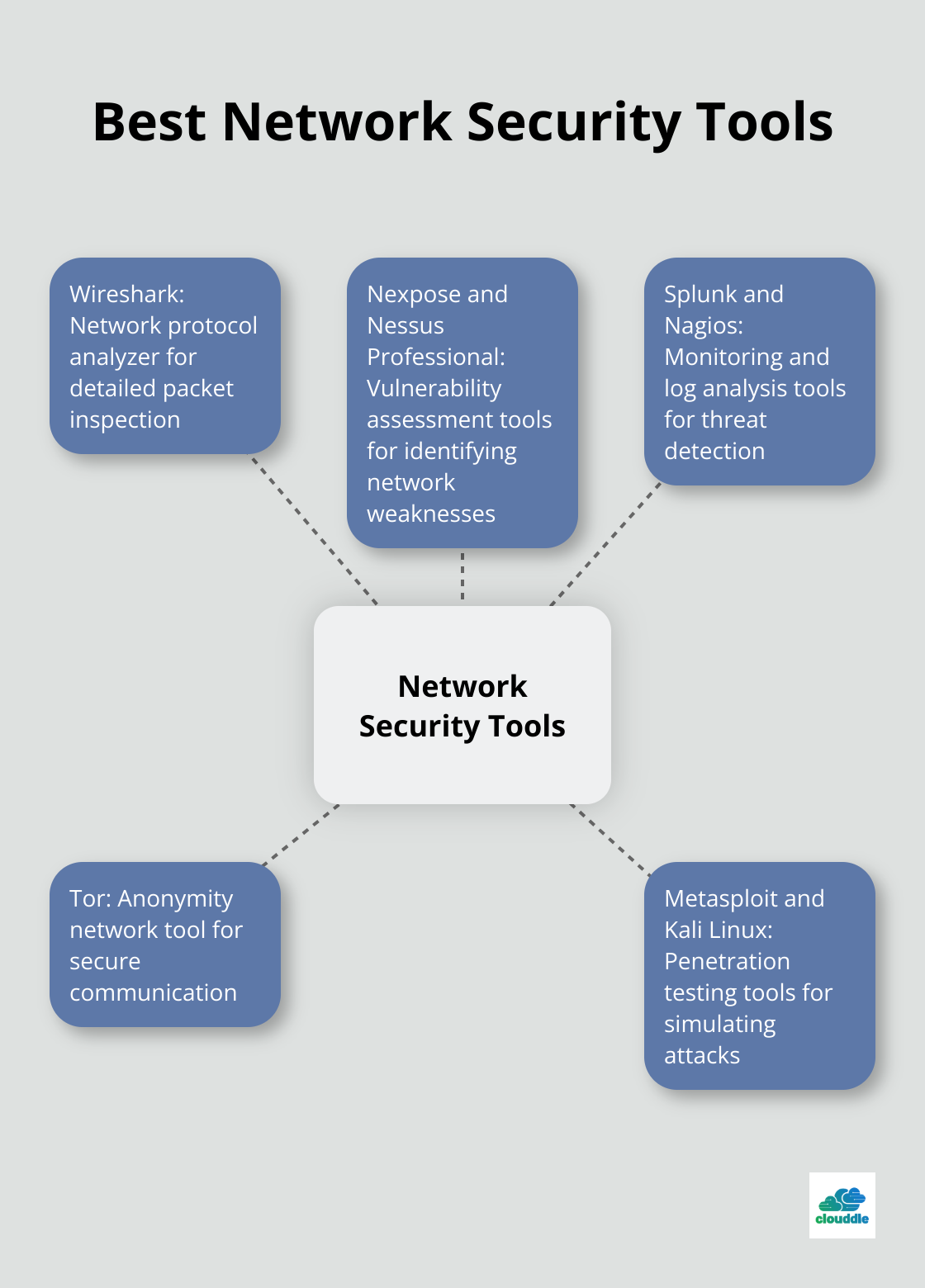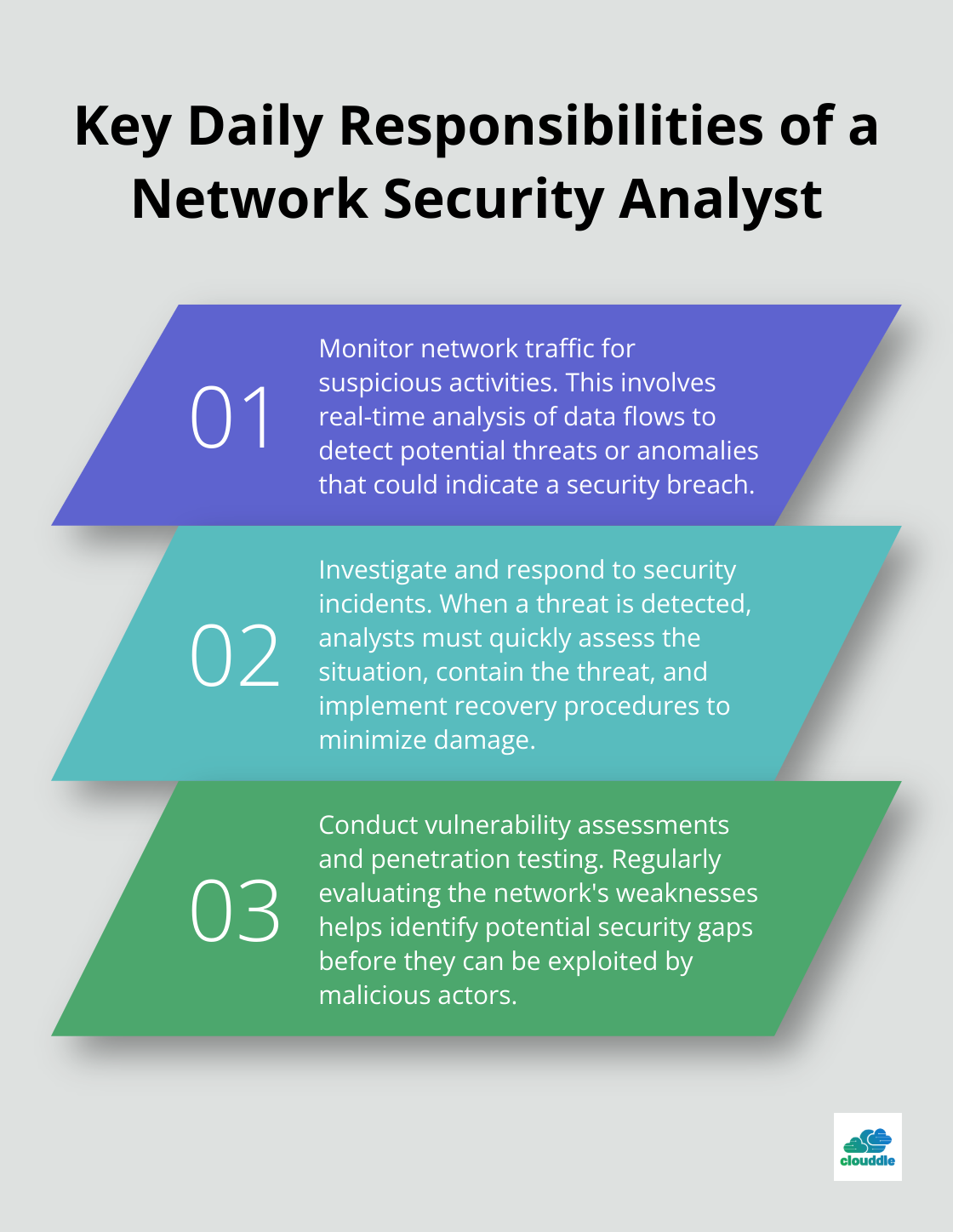Network security analysts play a vital role in safeguarding organizations from cyber threats. At Clouddle, we’ve seen firsthand how these professionals protect critical data and systems.
Pursuing a network security analyst job requires a unique blend of technical expertise and soft skills. This guide will walk you through the essential steps to launch your career in this dynamic field.
What Education Do You Need to Become a Network Security Analyst?
Network security analysts need a solid educational foundation to excel in this rapidly evolving field. Successful analysts typically combine formal education with practical certifications and ongoing learning.
Degree Programs That Open Doors
A bachelor’s degree in computer science, cybersecurity, or a related field often serves as the starting point for aspiring network security analysts. These programs provide a strong foundation in programming, network architecture, and security principles. Some universities now offer specialized degrees in network security or information assurance, which can give you a competitive edge.
The U.S. Bureau of Labor Statistics reports that about 55% of cybersecurity analysts hold a bachelor’s degree, while 40% have pursued a master’s degree. This trend underscores the value of higher education in this field.

Certifications That Boost Your Credibility
While a degree provides theoretical knowledge, certifications demonstrate practical skills that employers value. Key certifications for network security analysts include:
- CompTIA Security+: An entry-level certification that covers essential security concepts.
- Certified Information Systems Security Professional (CISSP): A certification that demonstrates expertise in cybersecurity leadership, implementation & management.
- Certified Ethical Hacker (CEH): Focuses on identifying vulnerabilities from a hacker’s perspective.
These certifications not only validate your skills but can also lead to higher salaries. For instance, cloud security skills can result in a salary premium according to industry reports.
Continuous Learning: Staying Ahead of Threats
The cybersecurity landscape changes rapidly, making continuous education essential. Some effective ways to keep learning include:
- Attending industry conferences like Black Hat and DEF CON
- Participating in online courses and webinars
- Engaging in hands-on labs and capture-the-flag competitions
- Following reputable cybersecurity blogs and podcasts
Resources like SANS StormCast and CISA Alerts provide daily updates on emerging threats, helping analysts stay ahead of potential risks.
Practical Experience: Bridging Theory and Practice
While formal education and certifications are important, practical experience plays a vital role in becoming a successful network security analyst. Try to:
- Seek internships or entry-level positions in IT departments
- Participate in open-source projects related to cybersecurity
- Set up a home lab to practice network security techniques
- Contribute to bug bounty programs to hone your skills
These hands-on experiences will complement your theoretical knowledge and make you a more attractive candidate to potential employers.
As we move forward, let’s explore the key skills that set successful network security analysts apart from the rest.
What Skills Do Network Security Analysts Need?
Network security analysts require a diverse skill set to excel in their roles. The most effective analysts combine technical expertise with strong soft skills and proficiency in cybersecurity tools.
Technical Prowess
Successful network security analysts possess a deep understanding of network architectures, protocols, and security principles. Proficiency in programming languages like Python and PowerShell is essential for task automation and data analysis.
Knowledge of operating systems (Windows, Linux, and macOS) is fundamental. Analysts must understand the intricacies of each system to identify vulnerabilities and implement appropriate security measures. Familiarity with cloud platforms like AWS and Azure is increasingly important as organizations migrate to cloud environments.
People Skills Matter
While technical skills form the foundation, soft skills distinguish exceptional analysts. Clear communication is vital when explaining complex security concepts to non-technical stakeholders.
Critical thinking and problem-solving abilities are essential for analyzing threats and developing mitigation strategies. Analysts must think creatively to anticipate potential vulnerabilities and stay ahead of cybercriminals.
Collaboration is key in cybersecurity teams. Analysts often work closely with IT departments, management, and external vendors. The ability to work effectively in a team environment can significantly impact an analyst’s success.
Mastering Cybersecurity Tools
Proficiency with a range of cybersecurity tools is non-negotiable for network security analysts. Some of the best network security tools include Wireshark, Nexpose, Splunk, Nagios, Tor, Nessus Professional, Metasploit, and Kali Linux.

Intrusion Prevention Systems (IPS) are critical for identifying and blocking potential threats. Analysts should excel in configuring and managing these systems to protect network infrastructure effectively.
Vulnerability assessment tools are essential for identifying weaknesses in network systems. Proficiency with these tools allows analysts to proactively address potential security gaps before exploitation.
Skills in digital forensics and malware analysis tools are increasingly important. As cyber threats become more sophisticated, the ability to investigate and respond to incidents quickly is paramount.
The next chapter will explore the career path and job responsibilities of network security analysts, providing insights into the day-to-day tasks and potential for growth in this dynamic field.
What Does a Network Security Analyst Career Look Like?
Starting Your Career
Entry-level positions in network security often start with roles such as Junior Security Analyst or Network Operations Center (NOC) Technician. These positions provide a foundation for understanding network infrastructure and basic security protocols. You’ll monitor network traffic, respond to alerts, and assist with routine security tasks.
To stand out in entry-level roles, develop practical skills. Set up a home lab to practice configuring firewalls and intrusion detection systems. Participate in capture-the-flag competitions to sharpen your problem-solving abilities. These hands-on experiences will make you a more attractive candidate for advancement.
Career Progression
As you gain experience, you can advance to mid-level positions such as Network Security Analyst or Information Security Specialist. These roles involve more complex responsibilities, including conducting vulnerability assessments, implementing security policies, and leading incident response efforts.
To accelerate your career growth, consider specializing in high-demand areas like cloud security or threat intelligence. The U.S. Bureau of Labor Statistics projects 33% job growth for information security analysts from 2023 to 2033, indicating ample opportunities for advancement.
Senior positions, such as Security Architect or Chief Information Security Officer (CISO), require a combination of technical expertise and leadership skills. These roles involve developing comprehensive security strategies, managing teams, and communicating with executive leadership.
Daily Responsibilities
The day-to-day tasks of a network security analyst are diverse and dynamic. A typical day might include:
- Monitoring network traffic for suspicious activities
- Investigating and responding to security incidents
- Conducting vulnerability assessments and penetration testing
- Updating and patching security systems
- Collaborating with IT teams on security implementations
- Analyzing threat intelligence reports
- Developing and updating security policies and procedures
- Training employees on security best practices

One of the most important responsibilities is staying ahead of emerging threats. This requires continuous learning and adaptation. Try to subscribe to threat intelligence feeds, participate in industry forums, and regularly update your skills to remain effective in this ever-evolving field.
Balancing Technical and Soft Skills
While technical proficiency is important, don’t underestimate the value of soft skills. Strong communication abilities are essential for explaining complex security concepts to non-technical stakeholders. You’ll often need to translate technical jargon into business terms when presenting to executives or board members.
Problem-solving and critical thinking skills are equally vital. As a network security analyst, you’ll frequently encounter novel threats that require innovative solutions. Develop a methodical approach to analyzing problems and implementing effective countermeasures.
Teamwork is another key aspect of the job. You’ll collaborate closely with various departments (IT, legal, human resources, and executive leadership). Building strong relationships across the organization will enhance your effectiveness and open doors for career advancement.
To further boost your career prospects, consider pursuing network security certifications that can validate your skills and knowledge in the field.
Final Thoughts
The path to a network security analyst job combines education, certifications, and hands-on experience. A bachelor’s degree in computer science or cybersecurity forms the foundation, while certifications like CompTIA Security+ and CISSP validate expertise. The cybersecurity landscape changes rapidly, so professionals must stay current with the latest threats and technologies.
Network security analysts face a bright future with projected 33% job growth through 2033. This growth promises job security and opportunities for advancement in areas like cloud security or threat intelligence. Aspiring analysts should build skills now through home labs, competitions, and open-source security projects.
At Clouddle, we help businesses protect their assets and streamline operations through managed IT and security services. Your work as a network security analyst will impact organizations and individuals alike. Stay curious, embrace challenges, and continue to learn – the world of network security needs passionate professionals like you.


